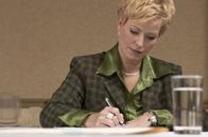 After spending all that time preparing for an interview and successfully sailing through it, do not drop the ball in the final hours. Here's a simple two-part approach that will take little time and yield great benefits by leaving an unmistakably good impression.
After spending all that time preparing for an interview and successfully sailing through it, do not drop the ball in the final hours. Here's a simple two-part approach that will take little time and yield great benefits by leaving an unmistakably good impression.
If your interview went well, you should contact your references to prepare them for a potential phone call or email from the employer. You might recap the interview briefly to each reference and highlight any points you made that they can verify, or emphasize, should they be asked by the interviewer for a testimony to your skills, experience and character.
You might end up saying something like this to a reference: "Jim, the company seemed really interested in the management skills I provided for the business development projects we worked on from 2010 to 2013. If asked, could you elaborate and stress the important role I had during that time? You may recall it was a small team. No one volunteered to manage the projects except me, and they all turned out pretty successful."
It should be a given that references will agree with your point of view. If you have to persuade them, make sure they agree, in the end, with your perceptions. References can say the same good things about you, but you should remind them with an example or two of the kinds of qualities you possess.
During the interview, if you mentioned strong communication skills, then have one of your references highlight that trait and point to a project in which your writing and speaking skills were exercised to a good end. If you showed up at work on time, always did what was told, always pitched in when needed, then a reference should be able to back you up on those traits.
Saying "thank you" in your job search isn't only an effective job search strategy, it's the right thing to do. Every thank you note or letter is an opportunity to sell your qualifications again. Sending a card or letter after an interview is common, but don't spare your thank you notes during the job hunt. Express your gratitude to employment contacts, members of your network and references who have extended themselves on your behalf, from informational interviewers to those who offer referrals or information.
Thank you may be said in person, by phone, an informal note such as a simple handwritten card, in a letter written on a word processor or by email. Overall, handwritten notes work best because they are the most personal form of communication unless your handwriting tends to be sloppy. The thank you letter should follow a standard business letter format. To add style to it try using a less formal font. The situation and your personal style will determine which one you send.
At the minimum, a thank you note or letter should be sent after all interviews. This is your chance to make one more impression before the decision is made. Send a thank you note even if you're turned down for a job. Let employers know you appreciate their consideration, and you'd be interested in future opportunities.
Some people may wonder if an email is too impersonal for a thank you. Write both types of notes if you're really interested in getting the job. Craft a brief email after the interview and then drop a thank you card to the company within 24 hours. Try not to be too overly enthusiastic in your thanks. Be professional, express your continued interest in the job and in working for the company, and mention your appreciation for the interview.
See our tips for writing your thank you letter.
